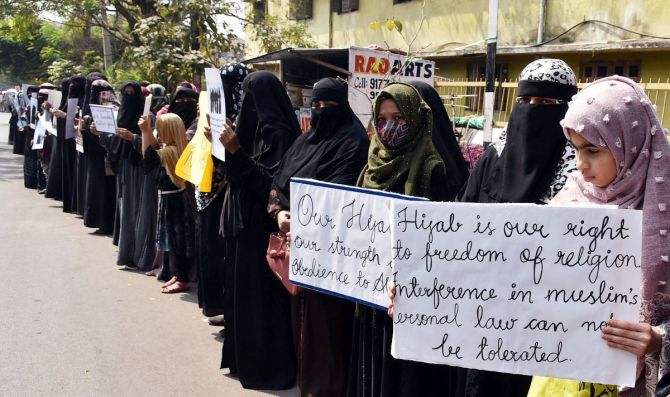India and Indians can ignore Pakistan, but that cannot be said of other nations in the neighbourhood, where New Delhi's 'Neighbourhood First' policy constantly reverberates.
Four of the eight SAARC member-nations are Muslim -- Afghanistan and Pakistan, Bangladesh and the Maldives. The rulers decide the nation's India or anti-India policy in the first two, and street-opinion contributes to the same in the latter two, points out N Sathiya Moorthy.

Even as the raging hijab row is consolidating society, politics and elections on religious lines -- and not necessarily in that order -- it has the potential to harden grassroots-level sentiments too in the South Asian neighbourhood.
This can go beyond India's traditional Pakistani adversary, which anyway does not lose an opportunity, even when there is none, to target India in international fora.
The ministry of external affairs has promptly denied Pakistani insinuations flowing from the hijab row.
'A matter regarding dress code in some educational institutions in the state of Karnataka is under judicial examination by the hon'ble high court of Karnataka,' MEA Spokesperson Aridam Baghchi said after the Pakistan government summoned the Indian charge d'affaires in Islamabad to register its concern over the hijab row that sprouted in a Karnataka school but soon spread across the state as violent street incidents with possible politico-electoral repercussions in distant Uttar Pradesh, where assembly polls are well under way.
<p'Our Constitutional framework and mechanisms, as well as our democratic ethos and polity, are the context in which issues are considered and resolved,' Bagchi said further. 'Those who know India well would have a proper appreciation of these realities. Motivating comments on our internal issues are not welcome.'
The government seems wanting to gloss over the Karnataka row implying that it is sub judice for even outsiders and their governments to comment upon until the Indian judiciary had pronounced its final verdict. But precisely for the same reason, foreigners and their governments wanting to criticise the Indian incident would do so without attracting contempt of court proceedings in India.
Pakistan is not the only nation to have adversely commented on the hijab row in India. US Ambassador-at-large for International Religious Freedom Rashad Hussain also said the hijab ban in schools 'violate religious' freedom. The MEA's Bagchi has dubbed the American's remarks as 'motivated comments' that are 'not welcome'.
India's sweeping counters of the kind may be in preparation for what may -- or may not -- flow from the bi-annual session of the UN Human Rights Council due to commence in Geneva later this month.
Likewise, the Organisation of Islamic Cooperation has reacted on predictable lines. In a statement, the OIC secretariat has urged the UN and the UNHRC to 'take necessary measures' in the context of hijab ban in India.
It has also called upon 'India to ensure the safety, security and well-being of the Muslim community, while protecting the way of life of its members and bring the instigators and perpetrators of acts of violence and hate-crimes against them to justice.'
In its reaction, the MEA's Bagchi has used strong words to condemn the OIC's 'communal mind-set'. In an obvious reference to Pakistan, the MEA said the 'OIC continues to be hijacked by vested interests to further their nefarious propaganda against India'.
The two Indian observations are true and factual, yes. But they have been so all along, so to say that OIC is driven by a 'communal mindset' is re-stating the obvious. After all, as the very name and membership imply and indicate, the OIC is an organisation of Islamic nations and Islamic interests. But their collective Islamic voting strength in international fora like the UNHRC at any given point in time is not small, either. Full-stop.
Likewise, centre-right sections in India that had hailed the OIC in none-too-distant past, first for inviting then external affairs minister Sushma Swaraj to address them, and also for pooh-poohing Pakistan's Kashmir-centric India-baiting initiatives within the organisation, too need to take note of the OIC's changing moods and methods.
In context, they have to take note of the sweeping nature of the OIC observations, going beyond the immediate hijab row on hand, and referring to 'violence and hate crimes' against Muslim, and also their 'safety and security' in India.
It is also not unlikely that individual OIC members are also getting feedback from the very high number of migrant Indians working in those countries -- and these inputs are independent of the MEA's position on the 'Constitutional processes' in the country.
There is some strength in the argument about the partisanship in allowing the hijab in educational institutions that have school uniforms, precisely to rectify such biases, ab initio.
However, if one were to consider both private and public sector services in different parts of the country, such exemptions have always been made.
Thus, in all of south India, during the annual pilgrimage season to the Sabarimala temple in Kerala, state governments grant police personnel exemption from wearing boots and socks, and at the same time permit them to wear their beard and grow long hair.
Even in high-end corporate offices in those parts, men especially are permitted to wear black veshti/mundu and shirt, and also grow beard and hair, and go sans shoes and socks. This is as much a religious and cultural practice as the hijab is, though only periodical -- but was not widespread and religiously followed even in native Kerala until three or four decades ago.
It is thus that South Asian Muslims used to grow a long beard and wear a moustache when it was not the standard custom and practice in the Gulf-Arab nations, where Islam was born and from where it was propagated.
It was only in recent decades that a flowing beard sans moustache has been the identity of the fundamentalist Wahhabism school of Islam, based in Saudi Arabia. Incidentally, Wahhabis, identifiable by their long-flowing beards sans moustache, are conspicuous by their presence in pro-democracy political rallies in the Maldives, indicating that politics and religious practices may still be different, at least up to a point.
India and Indians can ignore Pakistan, but that cannot be said of other nations in the neighbourhood, where New Delhi's 'Neighbourhood First' policy constantly reverberates.
Four of the eight SAARC member-nations are Muslim -- Afghanistan and Pakistan, Bangladesh and the Maldives. The rulers decide the nation's India or anti-India policy in the first two, and street-opinion contributes to the same in the latter two.
Like India, Sri Lanka too has a sizeable Muslim presence, though they are not as tuned to India as their Sri Lankan Tamil counterparts are.
India needs the neighbourhood as much as the other way round, at times even more. Their needs from India are economic, and at times physical, like post-tsunami rescue and relief operations (Sri Lanka and the Maldives, 2004), post-Himalayan earthquake (Nepal, 2015) and recurrent cyclonic storms (Bangladesh).
India's needs from them are strategic, to keep Pakistan and China away from its land and sea borders, and not necessarily in that order.
Thankfully, the usurious nature of China's assistance, first in the case of Sri Lanka in the neighbourhood, should make other neighbours too to sit up and take notice. It also means that anti-India politics will need more than a China plank to re-launch their cause nearer home.
Going beyond Constitutional issues like the supersession of Article 370 on the Kashmir front and the court-ordered Ayodhya land ownership dispute, incidents of lynching, instant talaq ban and the hijab row have the potential to trigger anti-India sentiments on the streets of neighbourhood nations.
Electoral democracies as they are, nations like Bangladesh and the Maldives, for instance, cannot ignore or continually over-rule street sentiments, which reflect in electoral decisions, though it may not be the only issue the people their vote in or vote out a government.
With Pakistan and Afghanistan, there are five neighbourhood nations of concern for India, barring Nepal and Bhutan, from a religious-persecution angle. The Sri Lankan State banned the hijab and other face-cover for Muslim women after the 2019 Easter serial blasts, but in that country, it was not an age-old practice unlike in India.
As Indian intelligence found out even in the Sri Lanka blasts, there are links between radicalised Islamist elements in the two countries. There is nothing to suggest that those links and contacts have evaporated.
Bangladesh has a liberal society, yes, and there is an India-friendly government. But Prime Minister Sheikh Hasina, having effectively extinguished political opposition in the form of Begum Khaleda Zia's Bangladesh National Party, too, has not identified a line of succession within her Awami League, with the result the nation's political future looks tentative and 'vacuumised'.
It is not a desirable state for India to count on endlessly because radicalised sections that Hasina had atomised along with the BNP may be waiting to rear their ugly, anti-India heads all over again.
The Maldives is where India's instant 'Islamic nationalist' troubles are centred just now, especially after the political Opposition of former president Abdulla Yameen launched a nation-wide 'India Out' campaign months ago, and owned it up as theirs in recent weeks.
Given that Yameen is still facing court cases that could lead to disqualification from contesting the presidential polls later next year, issues like the hijab ban can breathe fresh life into the campaign, which is primarily centred on economic development with an undercurrent of 'Islamic nationalism'.
Against this regional background, the periodicity with which such anti-Muslim/anti-minority sentiments get violent expression on Indian streets, and the perception that it had the State's blessings, should be of greater concern in terms of neighbourhood policy.
This is contrary to the India that neighbours have got used to through their collective history and historic memory, more so through the, post-colonial past of the 20th century.
The immediate neighbourhood apart, Islamic nations that may not be strict on the hijab or other forms of face cover for their women will frown upon if they see a Muslim harassment angle in it.
It could be more so at a time when the centre-right social media in India are celebrating the UAE, for instance, heralding 'secularism' in the Gulf-Arab region, by facilitating the construction of places of worship of every religion that is being practised there. Hinduism is one.
At a time when New Delhi is expanding its strategic-reach from West Asia to South-East Asia, hardcore Islamist parties, whether in government or the Opposition in most of those countries, may either come under domestic pressure, or apply that pressure, when reports on the hijab ban reach their drawing rooms through television news channels.
Not all of them can then talk the language that New Delhi would be happy to hear.
And that is what anti-India elements, especially outside the country and in the immediate neighbourhood, too, would be happy about!
N Sathiya Moorthy, veteran journalist, political analyst and author, is Distinguished Fellow and Head-Chennai Initiative, Observer Research Foundation. Email: sathiyam54@nsathiyamoorthy.com.










